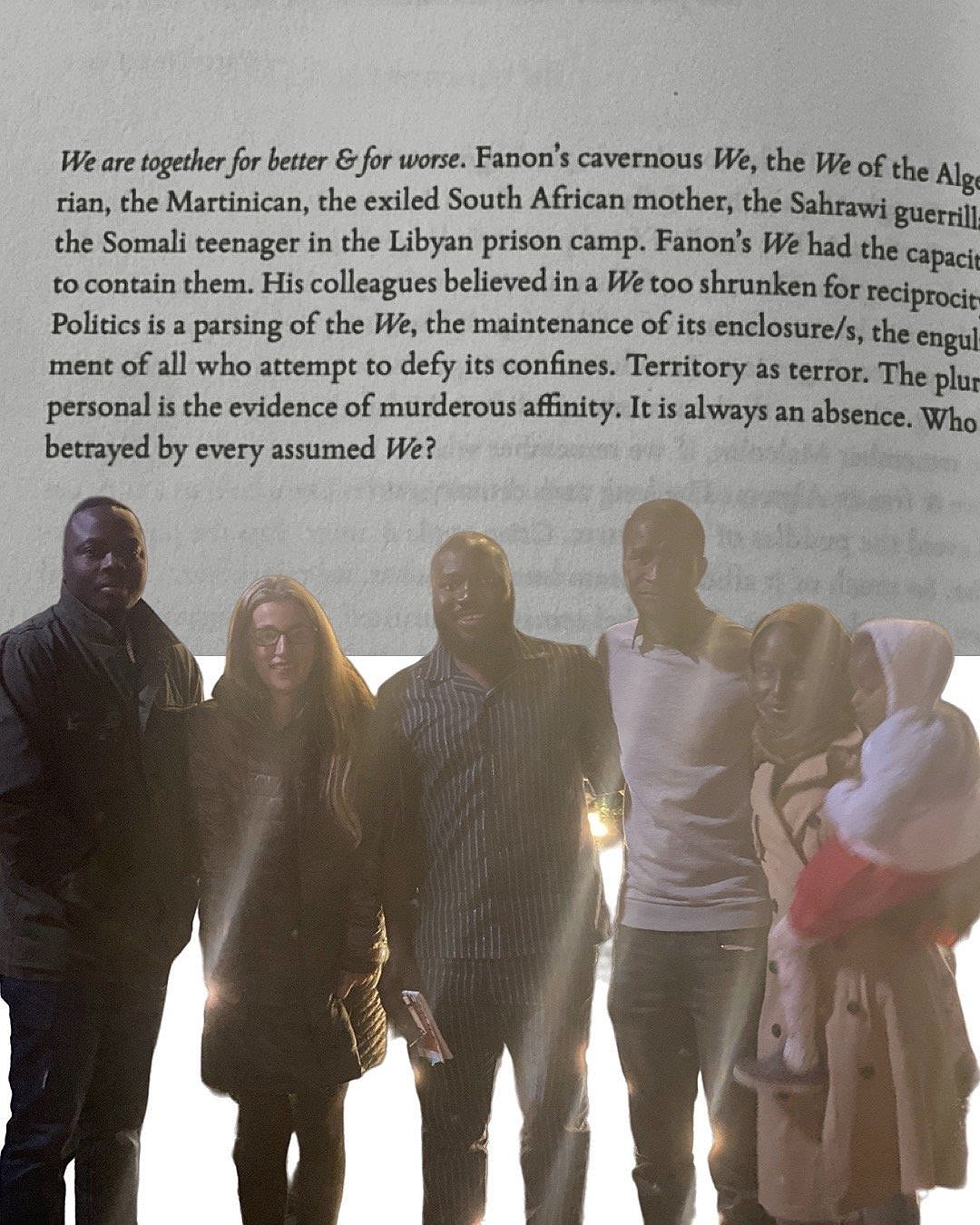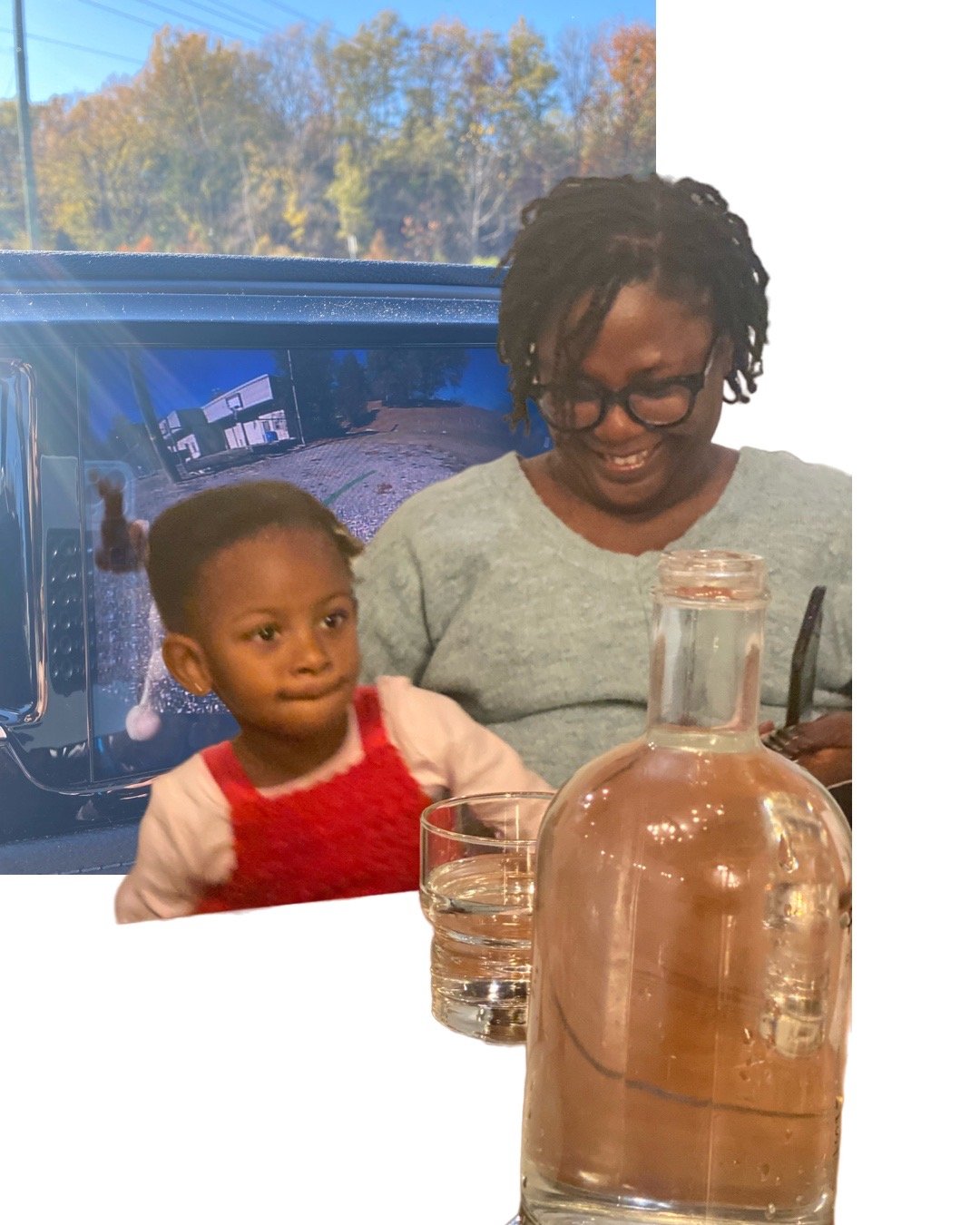1
“I speak Nigerian English,” Romeo said nonchalantly, on the first cold day of this year.
We were on a college campus in Kansas. The door to our left had a sign reading no guns or smoking on campus. We stood next to it and smoked cigarettes in the rain.
Although I heard Romeo’s comment, I’m not sure I understood it until several months later, when Romeo, Hussain, and I stood on a college campus in Mississippi and prepared to enter a building for a panel. The reading series was titled “Othered”, and I wasn’t sure how my own experiences as a white, Eastern European immigrant fit into the conversation.
At one point, Romeo and Hussain switched from American into Nigerian English, their voices softening. The language passed like a jazz brush warmly between them.
I didn’t understand a single word of it. But it sounded like home.
2
Inside the building, we read poems — Saddiq introduced a conversation with Nietzsche that remains in my head; Hussain invoked the sacred and the poetics of speaking into ancestry; both provoked interiority and thoughtfulness— I don’t remember what I read. Then we sat on the stage for a conversation led by the brilliant Olufunke Ogundimu, and I struggled to balance the self who writes with the self who would rather disappear. Public conversations always involve this tension, this struggle between the ebullient Alina and the Alina who feels most herself in a notebook, thinking about what others are saying while disappearing into text.
At one point, Saddiq spoke about Islam and his own relationship to Arabic, which he acknowledged as a “colonial language.” He spoke about the Nigerian self that exists between histories of colonization and erasures of distinction. He gestured towards hybridity as it means of remaining whole, or fashioning a livable self that can link the experience of being a Muslim Nigerian immigrant and a Black American professor.
Smiling, shaking his head, Saddiq recounted having been in Walmart when he learned that a niece had been born back home in Nigeria. He was walking between aisles and congratulating his family on the new baby. “Allahu Akbar!”, he exclaimed. “God is the greatest.” “What a blessing.” “God is good.” These are the phrases that people of faith often use when something tremendous is granted. And a baby is something tremendous anywhere in the world.
Suddenly, the space in Wal-Mart grew quieter. Saddiq noticed a white man staring at him, a gun strapped to his hip.
This moment—the moment when one looks up from the world of one’s first language and family to perceives the self as written by American scripts, as read by their limited stereotypes, as displaced by their wary eyes—is resonant. I mean: the world rumbles a bit around you.
The poet steps back to survey the self and make it friendly to the man with a gun.
The writer straddles the space between selves.
The immigrant begins the long process of translation that marks the apology for the homeland self, the “other” one is to beloveds.
The fear of being misunderstood exists in relation to the knowledge of violence; the quickness with which misunderstanding escalates into a threat for the American who loves to order his favorite Mexican food in Spanish but cannot stand a language that does not exist to him.
I don’t have words for how the shape of a room collapses when you realize that you are the danger. And how frightening it is— how terrifying— to discover that you are most threatening when you exist as yourself, in that mouth between languages, in the faith and culture that formed you.
3
That night, we went out to dinner at a lovely Italian restaurant. The writers moved between American and Nigerian English, or Nigerian Pidgin. Saddiq’s young daughter moved between laps and doodled on paper as the adults spoke. She smiled to herself and named her drawings. I was enchanted by her sweetness. Again, there was this strange sensation of feeling at home in a foreign language, or feeling safe in this space where the voices rose and fell in Pidgin, and the faces loosened as their bodies took on the intonation and gestures.
Were they recognizing themselves in it?
It felt as if I was being permitted to recognize them more completely, more fully, aware of what belonged to them—-what existed that remained unknowable—but grateful to see them in this fullness.
There was also a sense in which a homeland was being negotiated and created over pasta, salad, wine, and water. A communion. An encounter in being present as diasporas meet one another within the syntax of their native language.
In my experience, when I (rarely) begin to speak Romanian in the same room as an American, the American immediately takes offense. Perhaps we of the US are predisposed to expect our neocolonial colonial language gets over every border, into every room, and grants us access to any conversation on the planet. Perhaps there is something of the ugly American in this expectation . . .
4
At the restaurant table, the Nigerians took up controversial issues about publication and patronage in their diaspora. They did not chit-chat. They did not practice “active listening” or engage therapeutic modalities in order to communicate. They simply argued, debated, threw up their hands, laughed, and returned to underline earlier points relentlessly. I adored them. The restaurant felt passionately intellectual and Nigerian, and the intensity less fake or performative than the plastic version of American conversational intimacy where nothing is said and everything is expected.
In 1994, Edward Said told a British audience that “the intellectual is beset and remorselessly challenged by the problem of loyalty.” Loyalty provides access to status in diasporas. “An insider” must promote national interests in public, Said continued, but the intellectuals “should be the ones to question patriotic nationalism” and challenge “corporate thinking.” By corporate thinking, Said was referring to the political We, the rhetorical We that presumes to speak for others by nature of its status and expertise.
The diasporic We is complicated. (At present, I am obsessed with Momtaza Mehri’s Bad Diaspora, a poetry collection that pushes against what we owe the We, and how loyalty is constructed across borders.) But the facility of the “me” is also complicated by the expectations of meritocracy and respectability.
I mean: Shame tiptoes into rooms wearing respectable slippers. My diaspora is very conscious of not offending Americanism. Even in Romanian groups and meetings, I’ve been admonished for leaping into Romanian to express something intimate in the language it wants to speak.
"Let’s not do that,” the woman from my diaspora said. “Speaking Romanian is rude to our guests.” Even when the room is limited to Romanians, we are performing for the absent West.
Romanian is rude. Or Romanians are ashamed to be seen wearing it out in public. Romanian stays in the closet between shoes like our dirty little secret.
Romeo Oriogun, Hussain Ahmed, and Saddiq Dzukogi.
5
To return for a moment to the intellectual part, the shameless, Said-inflected part: the commitment at the dinner table was to thinking aloud and to questioning the terms of existence as they have been given. The Nigerian writers were not attempting to prove their loyalty or fidelity to a flag. Nor were they rationalizing a government policy to soothe the ruffled feathers of American exceptionalism. No one used dinner as a staging ground for proving one’s worth to the US meritocracy.
Unlike the worry in diasporic silence, the sagacity of investigation set the tone for the table talk. The discussion occurred as if thinking through ideas came first, as if thinking, itself, was the endeavor worthy of loyalty.
These days, the US is hardly exceptional to anyone except the refugees and immigrants. We are the constituents of earning one’s place, whether visa or citizenship. Our sense of self is implicated in the “land of opportunity.” Our notions of success and value are indebted to it.
To quote Said again:
The intellectual is an individual endowed with a faculty for representing, embodying, articulating a message, a view, an attitude, philosophy or opinion to, as well as for, a public. And this role has an edge to it, and cannot be played without a sense of being someone whose place it is publicly to raise embarrassing questions, to confront orthodoxy and dogma (rather than to produce them), to be someone who cannot easily be co-opted by governments or corporations, and whose rai son d'etre is to represent all those people and issues that are routinely forgotten or swept under the rug. The intellectual does so on the basis of universal principles: that all human beings are entitled to expect decent standards of behavior concerning freedom and justice from worldly powers or nations, and that deliberate or inadvertent violations of these standards need to be testified and fought against courageously.
Let me put this in personal terms: as an intellectual I present my concerns before an audience or constituency, but this is not just a matter of how I articulate them, but also of what I myself, as someone who is trying to advance the cause of freedom and justice, also represent. I say or write these things because after much reflection they are what I believe; and I also want to persuade others of this view. There is therefore this quite complicated mix between the private and the public worlds, my own history, values, writings and positions as they derive from my experiences, on the one hand, and, on the other hand, how these enter into the social world where people debate and make decisions about war and freedom and justice. There is no such thing as a private intellectual, since the moment you set down words and then publish them you have entered the public world. Nor is there only a public intellectual, someone who exists just as a figurehead or spokesperson or symbol of a cause, movement, or position. There is always the personal inflection and the private sensibility, and those give meaning to what is being said or written. Least of all should an intellectual be there to make his/her audiences feel good: the whole point is to be embarrassing, contrary, even unpleasant.
[…] the intellectual, in my sense of the word, is neither a pacifier nor a consensus-builder, but someone whose whole being is staked on a critical sense, a sense of being unwilling to accept easy formulas, or ready-made cliches, or the smooth, ever-so-accommodating confirmations of what the powerful or conventional have to say, and what they do. Not just passively unwillingly, but actively willing to say so in public.
6
“God bless you,” the grocery store clerk said while ringing up my groceries at Piggly Wiggly today.
In Alabama, “God bless you” is like the quarter one drops in a parking meter to follow the rules of appropriate behavior. No one reaches for a gun when God comes up. Presumably, American Jesus, himself, armed the South with guns in order to prepare for his second coming.
“God bless you” is part of a language that crosses races, including Black persons as well as white ones, and makes itself known in public spaces. But to say “God bless you” in another language is to risk being seen or made visible. To be visible as a person of color speaking a foreign language is to risk being determined unintelligible.
To say God is the greatest in Arabic is to be deemed a security threat by the richest, most powerful country in the world.
7
Representations of the Intellectual by Edward Said (PDF)
“There is always the personal inflection and the private sensibility, and those give meaning to what is being said or written. Least of all should an intellectual be there to make his/her audiences feel good: the whole point is to be embarrassing, contrary, even unpleasant.”
Edward Said stayed with me on the drive home from Mississippi, and I am sharing copy of his book that celebrates the “amateur” over the expert at a time when foreign policy “experts” continue to sell us violence and war rather than visions for the future. I share it out of gratitude for the minds that met in Mississippi, as well as a relentless hope for a future that includes thinking.
And I keep the joy of that restaurant table at hand. I cherish it as a souvenir, a testament to being alive and at-home in the opening world of othered languages and the resistance to a simple, assimilated self.
“The exilic intellectual does not respond to the logic of the conventional, but to the audacity of daring, and representing change, to moving on, not standing still,” Said wrote. In different ways, each of the Nigerian writers embodied this dedication to the audacity of daring as writers and humans. I leave the scene in my mind with one final toast, a toast to the Nigerian voices, and to not selling one’s complicated self for that feeble, “exemplary” standing.
One Jesus sign, among the 7 encountered, on the drive towards Mississippi State University.




